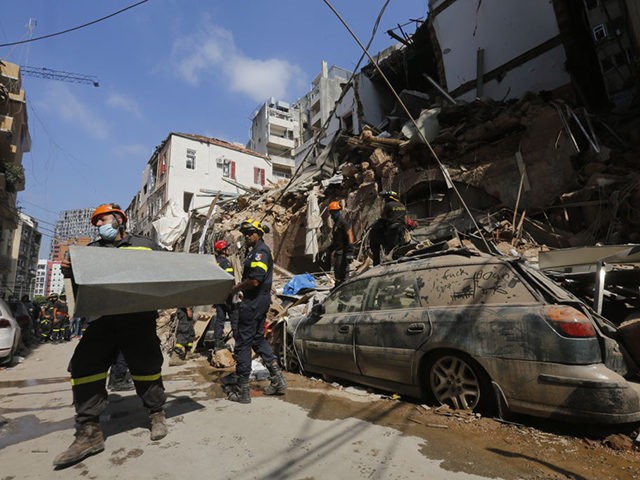The U.S. “should lift sanctions imposed against Lebanese people” following the port explosion in Beirut on Tuesday, Iran’s Foreign Ministry said on Thursday.
As the U.S. has no blanket sanctions imposed on the “Lebanese people,” the ministry was almost certainly referring to extensive sanctions placed on Hezbollah, an Iranian Shiite terrorist organization active in Lebanon as a political party, and individual politicians in the country for their support of Hezbollah.
On Tuesday, a cargo of ammonium nitrate stored in the port of Beirut exploded, causing immense damage to Lebanon’s capital. The blast killed at least 157 people, injured 5,000 others, and left thousands homeless. Lebanon has announced a two-week state of emergency in Beirut, and has placed the military in charge of security control in the capital, Al Jazeera reported.
U.S. President Donald Trump on Wednesday offered support for Lebanon.
“We’re standing with that country. You know, we have a very good relationship with that country, but it is a country under a lot of turmoil and a lot of problems. We stand with them,” he affirmed.
Earlier Wednesday, U.S. Secretary of State Mike Pompeo offered condolences, solidarity, and assistance to Lebanon in a phone call with Lebanese Prime Minister Hassan Diab, the U.S. State Department said in a statement. Pompeo pledged “steadfast commitment to assist the Lebanese people as they cope with the aftermath” of the explosion.
“You’ll see the United States announce a number of things we intend to do to assist the people of Lebanon in the coming days,” Pompeo said at a press conference later Wednesday.
Responding to U.S. offers to support Lebanon, Iran’s Foreign Ministry Spokesman Seyed Abbas Mousavi said on Thursday, “This is one of hypocrisies and deceptions of … the United States that have always tried to fish in troubled water. If they are honest, they should lift sanctions imposed against Lebanese people.”
Mousavi referred to U.S. sanctions on Hezbollah, Iran’s proxy terrorist group in Lebanon. The U.S. designated Hezbollah a foreign terrorist organization in 1997. However, Mousavi’s claim that U.S. sanctions have targeted “Lebanese people” is incorrect and contrasts with the stated objective of U.S. sanctions on the Iran-backed terrorist group.
In 2017, the U.S. imposed sanctions on Hezbollah, including its officials and “any entities found to support the group, such as by providing weapons,” Reuters reported. Through the sanctions, the U.S. aims to deprive Hezbollah of economic support. In September 2019, U.S. Treasury Assistant Secretary for Terrorist Financing Marshall Billingslea said Iran used to send Hezbollah $700 million a year, but U.S. sanctions on Iran have “diminished considerably” this source of income, the Associated Press (AP) reported.
Hezbollah has planted its own proxies within Lebanon’s coalition government.
“Hezbollah and its allies have more power than ever in [Lebanon’s] parliament and government and [Lebanese] President Michel Aoun is a strong ally of the group,” the AP noted in October 2019.

COMMENTS
Please let us know if you're having issues with commenting.